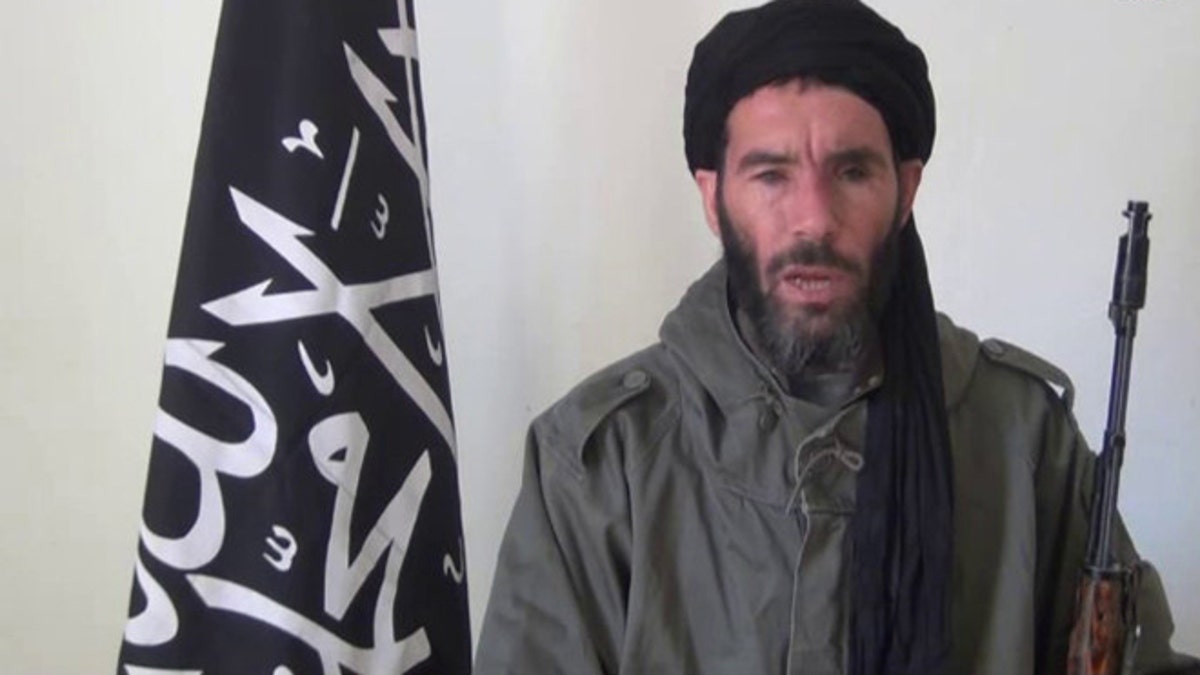
This image taken from video provided by the SITE Intel Group made available Thursday Jan. 17, 2013, purports to show militant militia leader Moktar Belmoktar. (AP/SITE Iniel Group)
Chadian troops deployed in northern Mali have killed Moktar Belmoktar, the mastermind behind the mid-January attack on a natural gas plant in Algeria that left 36 foreigners dead, Chad's military chief said late Saturday.
The death of one of the world's most wanted terrorists could not be confirmed by the French military, which has led the offensive against Al Qaeda-linked rebels in Mali since January, according to a Reuters report.
Local officials in Kidal, the northern town that is being used as the base for the military operation, cast doubt on the assertion, saying Chadian officials are attempting to score a PR victory to make up for the significant losses they have suffered in recent days.
Known as the "one-eyed," Belmoktar's profile soared after the mid-January attack and mass hostage-taking on a huge Algerian gas plant. His purported death comes a day after Chad's president said his troops had killed Abou Zeid, the other main Al Qaeda commander operating in northern Mali.
If both deaths are confirmed, it would mean that the international intervention in Mali had succeeded in decapitating two of the pillars of Al Qaeda in the Sahara.
"Chad's armed forces in Mali have completely destroyed a base used by jihadists and narcotraffickers in the Adrar and Ifoghas mountains" of northern Mali, Army Chief of Staff Gen. Zakaria Ngobongue said in a televised statement on state-owned National Chadian Television. "The provisional toll is as follows: Several terrorists killed, including Moktar Belmoktar."
The French military moved into Mali on Jan. 11 to push back militants linked to Belmoktar and Abou Zeid and other extremist groups who had imposed harsh Islamic rule in the north of the vast country and who were seen as an international terrorist threat.
France is trying to rally other African troops to help in the military campaign, since Mali's military is weak and poor. Chadian troops have offered the most robust reinforcement.
In Paris, French military spokesman Col. Thierry Burkhard said that he had "no information" on the possibility that Belmoktar was dead. The Foreign Ministry refused to confirm or deny the report.
A spokesman for Chad's presidential palace did not immediately return a request for comment.
In Washington, White House officials said they could not confirm the killing of Belmoktar, Reuters reported.
Rep. Ed Royce, R-Calif., chairman of the House Foreign Affairs Committee, told the news agency the killing of Belmoktar "would be a hard blow to the collection of jihadists operating across the region that are targeting American diplomats and energy workers."
In Kidal in northern Mali, an elected official, who requested anonymity because he was not authorized to speak to the press, said that he did not believe that Belmoktar was dead and waved off the claim as an attempt by Chad to explain the loss of dozens of their troops to a grieving nation.
"These last few weeks, the Chadians have lost a significant number of soldiers in combat. (Claiming that they killed Belmoktar) is a way to give some importance to their intervention in Mali," said the official, who keeps in close contact with both French and Malian commanders in the field.
Belmoktar, an Algerian, is believed to be in his 40s, and like his sometimes partner and sometimes rival, Abou Zeid, he began on the path to terrorism after Algeria's secular government voided the 1991 election won by an Islamic party.
Both men joined the Armed Islamic Group, or GIA, and later its offshoot, the GSPC, a group that carried out suicide bombings on Algerian government targets.
Around 2003, both men crossed into Mali, where they began a lucrative kidnapping business, snatching European tourists, aid workers, government employees and even diplomats and holding them for multimillion-dollar ransoms.
The Algerian terror cell amassed a significant war chest, and joined the Al Qaeda fold in 2006, renaming itself Al Qaeda in the Islamic Maghreb.
Belmoktar claims he trained in Afghanistan in the 1990s, including in one of Usama Bin Laden's camps. It was there that he reportedly lost an eye, earning him the nickname "Laaouar," Arabic for "one-eyed."
Until last December, Belmoktar and Abou Zeid headed separate brigades under the flag of Al Qaeda's chapter in the Sahara. But after months of reports of infighting between the two, Belmoktar peeled off, announcing the creation of his own terror unit, still loyal to the Al Qaeda ideology but separate from Al Qaeda in the Islamic Maghreb.
It was this group that launched the fatal attack on a BP-operated natural gas plant in southeastern Algeria in retaliation for the French-led military intervention in Mali.
In the attack and in the subsequent rescue attempt, 37 people, all but one of them foreigners, were killed inside the complex. Belmoktar claimed responsibility for the attack within hours, immediately catapulting him into the ranks of international terrorists.
In addition to the alleged killing of Belmoktar, Ngobongue said that Chad's military had also nabbed 60 of the jihadists' cars, electronic equipment and weapons. "The raid is still ongoing," he said.
The Associated Press and Reuters contributed to this report.
